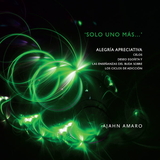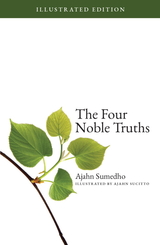

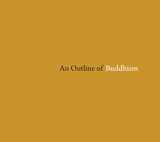
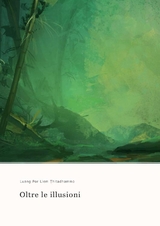

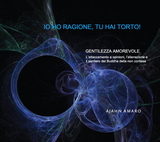
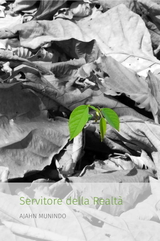
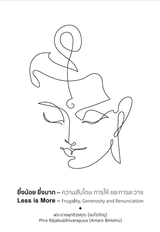

The theme for this afternoon’s talk is ‘Less is More – Frugality, Renunciation and Generosity’. I will focus on the frugality and renunciation aspects first of all and then get to generosity later on.
First of all, it struck me how, if we say that our usual philosophy in life is ‘more is better’, if ‘less is more’, then ‘less is better’ – if you follow the logic – which is a good way of summarizing this theme.
This is an important topic for our times. Probably the kind of people who gather together at a Buddhist monastery on a Sunday afternoon are not those overly committed to consumption (what we call the ‘consumer society’ as if we were just a mouth with legs on) but that doesn’t have to be the way we see ourselves, even though this is often the way that society and our value systems are conditioned to operate. In the very wonderful little book called Buddhist Economics by Venerable Payutto, a Thai philosopher monk, he succinctly describes classic economics as: ‘Maximum consumption leads to maximum happiness.’ It’s the basic ethic of the consumer society. The more you consume then the happier you are. Even though we might say, ‘I’m a Buddhist, I’m not like that!’ I think it’s helpful to reflect that, if we look around and we see our working life, our family life, the society we live in, a huge amount of our conditioning is like that. The more that you’ve got, the happier you should be, so there’s an enormous amount of drive to get more. Maybe it’s not physical possessions but at least more status or more Facebook followers or more Instagram followers, more likes, as well as the usual more property, more money and more approval and so forth. So that ‘more is better’ as an ethic for our society is very strong I would suggest; even if we’re not overtly materialistic, or we don’t see ourselves that way, that can still be a very powerful driving force. That said, this is also not solely a modern thing – the search for happiness through material possessions, through the sensory world – this has been part of our life in the human realm since distant ages past.
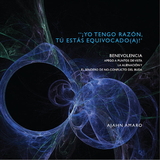
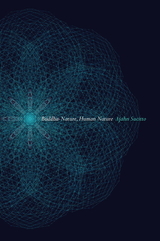
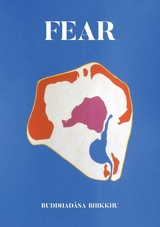
“In today’s discussion of Ego and Mine, I’d like to discuss fear. Fear is a form of suffering that hugely disturbs human well-being. Some of that fear ought not to be so disruptive, but is. Yet, we mostly hear about lust and greed (rāga and lobha), anger and hatred (kodha and dosa), when discussing the sources of suffering. Delusion (moha), with its broad boundaries, gets less attention. Here, we will consider fear as a variety of delusion. You should situate it correctly within the three kinds of kilesa, the defilements that obscure and pollute mind’s natural freedom and purity. Fear isn’t a form of greed or hatred, which means it’s a form of moha (delusion), of stupidity and blindness, of non-understanding. Not understanding something, we can be afraid of it continually…”
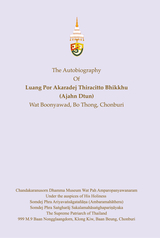
On the evenings of the twenty-second and twenty-third of November, 2017, a large number of monks, novices and laypeople gathered to participate in the official opening of a new monastery built under the auspices of His Holiness Somdej Phra Ariyavaṅsāgatañāṅa, the Supreme Patriarch of Thailand. The monastery is called Wat Pah Amparopanyawanaram (more commonly referred to as Wat Pah Amparo). Also being inaugurated was the Chandakaranusorn Dhamma Museum. His Holiness entrusted Luang Por Tui (Preeda) Chandakaro, who is presently one of the most respected senior elders in the Thai Forest Tradition, to take responsibility for the monastery’s construction.
Luang Por Tui personally selected the biographies of thirty-four monks of the Rattanakosin era from the early 1900s up to the present to be housed in the Dhamma Museum. Sometime in the month of July, 2017, Luang Por Tui had a lay person who was also a disciple of Luang Por Akaradej Thiracitto request his autobiography for inclusion in the museum. Luang Por Akaradej had always felt he would wait until he was at least seventy before writing one. On being requested, he said initially he couldn’t be bothered to write it himself, so he allowed this lay person to draft a brief biography. When it was brought to him for checking, he thought some things they had written weren’t quite correct or necessary, some parts had been embellished, and important details had been omitted. He felt if he allowed this version to be printed it would later prove to be at variance with his own version. Recognizing that this might confuse readers as to which version is most reliable, he chose to compile it himself. However, by this time there remained just over three weeks in which to write the autobiography and it give it to Luang Por Tui for checking before the printer’s deadline. He was aided by notes he had made in the early years of his practice which could jog his memory and help him expand on details.
Due to his many commitments as abbot of Wat Boonyawad and the time constraint placed on him, he feels that his autobiography is only seventy percent complete. During the three to four weeks given to him, he had to work late into each night to come up with a draft. The first chapters of this book are detailed, the later ones less so owing to a lack of time, and the autobiography only goes as far as 2003. The final pages, in fact, were still being worked on until 1 a.m. on the night before it was to be given to Luang Por Tui. Fortunately Luang Por Tui expressed his praise on reading the draft copy, and did not have to make any changes.
Luang Por Akaradej has said that sometime in the future he might get around to writing a complete version of his autobiography by inserting missing details and incidents that he failed to include. For any reader wishing to know more about his life, you will find the audio version of his biography (recorded in Melbourne, 2007) to be of interest.
Today, his feelings about writing his autobiography remain the same as it did in 1980 when he first started recording some details of his life and practice: If it can be of benefit or provide inspiration to even only a few people, then writing it will have been worthwhile. Finally, I would like to acknowledge my debt of gratitude to all who have helped in bringing this book to fruition. For any errors that may still remain in either text or translation, the translator accepts full responsibility, and humbly begs both Ajahn Dtun’s and the reader’s forgiveness.
The Translator, Wat Boonyawad June, 2020
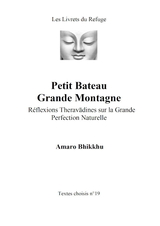
Titre original : Small Boat, Great Mountain
La rencontre de traditions spirituelles incluant celles des enseignements de sagesse du Theravāda et du Dzogchen, deux grandes expressions du Bouddha-Dharma, est un des principaux aspects bénéfiques de la vie à notre époque. La révolution technologique nous donne la possibilité de voyager, de communiquer et d’étudier les traditions de façon aisée. La plupart des grands textes spirituels sont en ligne, et un flot conséquent de conférences et de retraites rassemble méditants, érudits et maîtres spirituels, pour pratiquer et confronter ouvertement leurs lignées, leur compréhension et leur connaissance.
L’effondrement des champs spirituels séparés qui a lieu de nos jours est à la fois remarquable et sans précédent. Pour la première fois nous pouvons apprécier une vue large de toutes les traditions et voir où elles fusionnent ou entrent en collision.
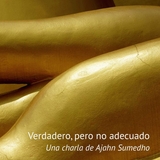
La vida religiosa es una vida de renuncia: renunciamos a las cosas, las abandonamos y las dejamos ir. Para la mente mundana, “renuncia” puede sonar a querer deshacerse de algo, a condenar el mundo de los sentidos o a rechazarlo porque vemos algo malo en él. Pero la renuncia no es un juicio moral sobre lo que sea. Es un alejamiento de lo que complica la vida y la hace difícil, hacia la simplicidad última de la atención plena en el momento presente. Porque la iluminación es aquí y ahora; la Verdad es ahora. No hay nadie para convertirse en lo que sea. No hay nadie que haya nacido o que vaya a morir, solo hay este eterno ahora. Esta consciencia ahora, es con lo que podemos conectar, a medida que abandonamos las apariencias y las tendencias habituales, y tendemos hacia esta simple reflexión sobre el presente.
